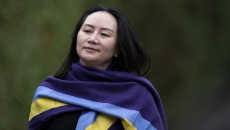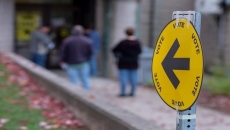Canada's procurement minister says a deal is close to receive Oxford-AstraZeneca vaccine doses from the U.S., while the military commander in charge of the rollout here says all adults who wish could be able to get their first shot by July 1.
"After numerous discussions with the Biden administration, Canada is in the process of finalizing an exchange agreement to receive 1.5 million doses of the AstraZeneca vaccine from the U.S.," Anita Anand said on Twitter on Thursday.
"We look forward to providing an update to Canadians once the details are finalized."<
After numerous discussions with the Biden administration, Canada is in the process of finalizing an exchange agreement to receive 1.5 million doses of the AstraZeneca vaccine from the U.S. We look forward to providing an update to Canadians once the details are finalized.
— Anita Anand (@AnitaOakville) March 18, 2021
White House press secretary Jen Psaki said earlier that another 2.5 million doses would go to Mexico, but the details were still being worked out.
The United States currently has seven million "releasable" doses of the vaccine, which has yet to receive approval from its Food and Drug Administration, she said.
The loan would be in lieu of a future exchange of doses from Canada and Mexico, Psaki said — either of the AstraZeneca vaccine or a different one.
"God Bless America. They're coming to our rescue," Ontario Premier Doug Ford told a news conference in Hamilton.
"I'll drive down there in my pickup and pick 'em up if we have to."
U.S. President Joe Biden did not address the vaccine exchange when he updated Americans on that country's vaccination progress.
He said the U.S. will have administered 100 million shots by Friday and that the country is on track to have enough vaccine supply to inoculate all adult Americans by the end of May.
Last week, Canadian provinces began administering 500,000 doses of the version of the AstraZeneca vaccine produced at the Serum Institute of India.
The federal government has purchased 20 million doses directly from AstraZeneca, but did not have a timeline for when they would arrive.
Regulators in Europe and the United Kingdom have concluded the benefits of the AstraZeneca vaccine outweigh the risks, but both are still studying whether the shot had any link to a small number of rare brain blood clots.
Earlier Thursday, Maj.-Gen. Dany Fortin, who is overseeing Canada's vaccine program logistics, said provinces should have enough doses by the end of the next quarter for everyone who wants to be vaccinated.
But he later clarified that depends on provinces continuing to delay second doses up to four months so that more people can get their first shot sooner, as well as supplies coming in as planned.
"While there is no indications of disruptions or fluctuations in the production, it is a pandemic with global demand on vaccines that are produced as rapidly as possible," Fortin said in Ottawa.
"We are always subject to fluctuations in the production and the challenges of a complicated supply chain across the world and into this country."
Although initial deliveries from Johnson & Johnson and shipments directly from AstraZeneca are still in limbo, there is more than enough from Pfizer-BioNTech, Moderna and the Oxford-AstraZeneca vaccine made in India to pass the one-dose-per-person target by the end of June.
Procurement numbers show there are 36.5 million doses confirmed to be shipped by June 30. Only people over the age of 16 can currently be vaccinated and about 31 million Canadians are in that age group.
Ottawa still says Canadians will be fully vaccinated by the end of September.
Canada's deputy chief public health officer Dr. Howard Njoo said almost seven per cent of Canadians have now received at least one dose of a COVID-19 vaccine, and 1.6 per cent have received two doses. The vast majority of doses given in the past two weeks have been first shots.
Also Thursday, the premiers of Nova Scotia, New Brunswick, Prince Edward Island and Newfoundland and Labrador said the Atlantic travel bubble will be restored by April 19. That means residents of the region will be able to travel within Atlantic Canada without having to isolate for 14 days.
Travel between the four provinces has been restricted since the end of November, following a number of COVID-19 outbreaks.
Meanwhile, Ontario, which is tightening restrictions in Ottawa amid "concerning trends", reported 1,553 new COVID-19 infections and 15 more deaths.
Quebec has surpassed 300,000 COVID-19 infections with the 702 new cases reported Thursday. The province also added seven more deaths in its latest update.






